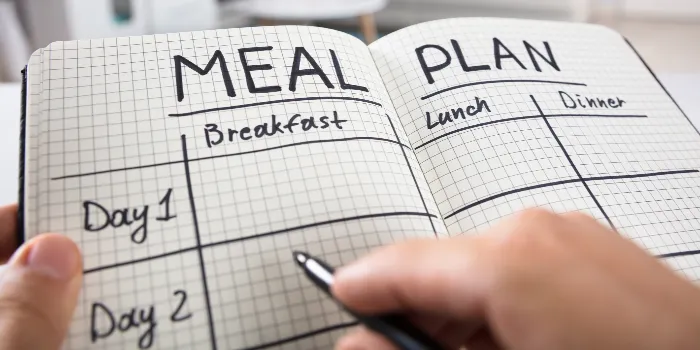It’s no secret that eating well has a major impact on your health—but it’s not just what you eat, it’s how you prepare your meals. Research shows that people who regularly eat home-cooked meals tend to be happier, healthier and eat less sugar and processed foods. And for those in the bleeding disorders community, a healthy diet is invaluable.
Cooking at home—and doing it well—is even more important now, as social distancing measures remain in effect during the COVID-19 pandemic. Those accustomed to eating out regularly have found themselves making more of their own meals since many restaurants remain closed.
While it is healthy, putting together nutritious home-cooked dishes for every meal is not easy, especially when juggling a busy work schedule, children and other responsibilities. How can you fit that into your daily routine? Enter the meal plan, where you map out exactly what you are going to eat, and when, throughout the week. Here’s what a meal plan can do for you.
The Benefits of Meal Planning
A meal plan leads to healthier choices.
Without a meal schedule, it’s easy to veer off the healthy path and opt for fast food or ready meals. The quickest food options are certainly convenient, but they’re often low in nutritional value and loaded with unhealthy ingredients. With a meal plan, you have a nutritious choice picked out already.
Planning meals also makes it easier to balance your diet. As you map out an entire day, you can clearly see if you are going to have too much of one food group and adjust accordingly.
A meal plan saves time.
Figuring out meals and shopping for them can become a daily activity without a meal plan. Who has time for that when managing so many other daily responsibilities? If you plan ahead, you can get a full week’s shopping done in one go.
A meal plan saves money.
So often, Americans buy or cook more than they really need. According to the Department of Agriculture, food waste in the United States is estimated at between 30% to 40% of the food supply. In 2010, approximately 133 billion pounds and $161 billion worth of food was wasted. You’ll only buy what you need, so you won’t be tossing food and money down the drain.
A meal plan reduces stress.
The last thing you want on a stressful day is to open your fridge and realize you don’t have anything for dinner. With a meal plan, you’ll have shopped and prepared for that night’s dinner already.
Tips to Making a Meal Plan
With the benefits in mind, here’s what to consider when making your own meal plan.
Use a meal-planning sheet or template.
When it comes to meal planning, the internet is your friend. There are dozens of free, printable meal planners out there that can keep you organized as you plan meals. Plus, you can store these so that you have successful weekly plans to refer back to.
Start with simple ideas.
Does prepping and cooking meals every day sound daunting? It doesn’t have to be. Just because you are planning meals doesn’t mean they have to be overly complex or time-consuming. You can start the first few weeks with simple options, such as cereal for breakfast and sandwiches for lunch.
Get the Family Involved.
If you’re cooking for more than just yourself, figure out everyone’s food preferences before making plans. You can go a step further and make meal planning a fun family activity by giving each person a role in the scheduling process. For example, let kids plan and cook a themed meal every so often—such as breakfast for dinner once a month—to get them excited about meal planning and cooking in general. When the whole family is invested, it’s that much easier to stay committed to your meal plan.
Create themed nights.
For many, dinner is the hardest and most time-consuming meal to prepare. You can simplify dinner plans by designating themed nights of the week, such as taco Tuesdays, pasta night on Wednesday or leftover night on Sunday.
Curate a list of recipes.
Found a great recipe online or in a cookbook? Dedicate space to store these recipes as you go. You can store them digitally (curation apps like Pocket make it easy), write them out in a journal, or put them in a binder full of printouts. Your hand-picked list of meals will make it easier to plan down the road.
Plan a few days before the week starts.
Doing all of the prep and grocery shopping on Sunday afternoon can be stressful and lead to poorly planned weeks. Instead, start making your list in the middle of the week.

